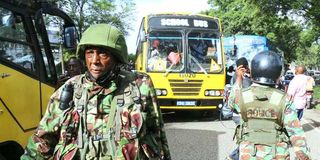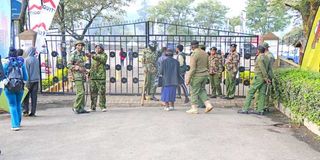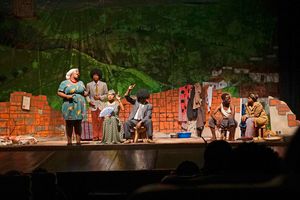
A cheering crowd escorts a school bus carrying Butere Girls from Melvin Jones Academy in Nakuru on April 10, 2025. The girls declined to perform their play, 'Echoes of War', instead opting to sing the national anthem during the ongoing National Drama and Film Festival.
Way back in 1977, the government banned staging of a protest play, Ngaahika Ndeenda, co-authored by Ngugi wa Thiongo and Ngugi wa Mirii at Kamirithu in Limuru, Kiambu. The play, translated in English as “I will marry when I want”, is a political satire excoriating the repressive and exploitative government that betrayed the ideals of independence struggle.
A few months after the ban, Ngugi wa Thiongo was detained without trial by the Jomo Kenyatta administration, accelerating the country’s downward spiral to oppression and dictatorship. Ngugi was released a year later by President Daniel arap Moi, who had ascended to power in August of 1978 following the death of the founding President Kenyatta. But a seed had been sown. Satirical and critical literature would not be entertained by the single-party Kanu regime.
In 1982, the licence of the theatre group associated with Ngugi, which was based at the Kamirithu Community Educational and Cultural Centre in Limuru, the present-day Kiambu County, was cancelled.
But Ngugi was not deterred. From the incarceration experience, Ngugi penned Detained: A Writer's Prison Diary, in 1981, detailing his experience behind the bars. Writers in Politics, also published in 1981, was a categorical declaration that artists were not mere spectators, but active commentators of socio-political, economic and cultural events in their society. Creative artists were patriots pushing the boundaries and fighting for rights and civil liberties.
The recent drama around the play Echoes of War by Butere Girls, which was written by former UDA Secretary General Cleophas Malala, mirrors the dark days in Kenya, from the late 1960s to early 1990s, when the oppressive Kanu regime sought to stamp out any form of dissent. Opposition politics had been proscribed with the ban of the Jaramogi Oginga Odinga-led Kenya People Union (KPU) in 1969. Plays, novels and other artistic works perceived to be critical of the Kanu regime were regularly outlawed.
Among others, the Kenya National Theatre, erstwhile a vibrant hub for artistic displays, was turned into a censor house, locking out plays perceived to be critical of the regime. The Films and Stage Plays Act was used liberally to deny playwrights licence to perform. The erstwhile vibrant University of Nairobi Travelling Theatre, among other creative and cultural groups, were under constant government watch with several productions stilled at conception.
During that period, productions presented at the Kenya National Drama Festival were thoroughly scrutinised to weed out, so to speak, any critical performance. To be sure, in 1982, the government issued a directive that it would henceforth provide the themes of plays to be presented at the drama festival. Political plays were consequently prohibited.
A research by Rose Wangui Komu, entitled A History of Kenyan Theatre: The Intersections between Culture and Politics, documents a series of plays that suffered this fate. Among the casualties was Kapsabet Girls, which found itself at the centre of a storm when it presented a play entitled Makwekwe (Weeds) produced by Tim Wandiri, a production perceived to be critical of the government.
The producer was punished and the adjudicators led by Prof Micere Mugo of the University of Nairobi were harangued for approving the play and allowing it to be presented at the national gala, a gathering presided over the President. The assault on the adjudicators among other travesties visited on critical and independent thinkers caused Prof Mugo, a radical scholar of her time, to flee to exile.
In 1984, a play by Cheperit Girls entitled Visiki (Stumps) produced by Khaemba Ongeti was also banned from the festival, again for political reasons.
The long chain of censorship blunted creativity and dumbed down performances at the schools’ drama festival. Playwrights and producers resorted to softer themes, prioritising form to content to evade the scythe.

Anti-riot police escort Butere Girls school bus which was ferrying students along 58 road in Nakuru after they declined to perform their play at Melvine Jones academy on April 10, 2025.
Away from the schools’ drama, creative performances were stymied across the country. In an article, entitled, Kenyan Theatre after Kamiriithu, published in MIT journal, Gichingirii Ndigirigi catalogues several plays that were denied licences for public performances during that tumultuous period, with the worst case reported in 1991 when eight plays were barred from performance.
Ironically, some of the banned plays such as An Enemy of the People by Norwegian playwright Henrick Ibsen, had been studied as school set books, indicating how injudicious and irrational the licensors were.
Also denied performance licences were: Dario Fo's Can't Pay, Won't Pay, Tewfik al-Hakim's The Fate of a Cockroach, and Oby ObyeroOdhiambo's, Drumbeats on Kerinyaga, among others.
Broadly, the clampdown on stage plays and other works of literature was the sub-text of the oppressive administration that relentlessly arrested government critics, including opposition politicians and human rights activists.
The controversy surrounding Echoes of War comes against the backdrop of abductions targeting critics since last year’s Gen Z pro-reforms protests that peaked in June.
Critics say the past two-and-a-half years under the Kenya Kwanza administration of President William Ruto have been traumatic.
They charge that the country is fast sliding into autocracy, paradoxically in era of a progressive Constitution passed in 2010 with an expansive bill of rights. There are also accusations that independent institutions such as Parliament and the Judiciary have been subjugated, while the political opposition has been silenced through cooption into government.
Even so, the backlash over the government’s handling of the Butere Girls melodrama is an eloquent statement against authoritarianism. No less authority than Chief Justice Martha Koome admonished the government over the abhorrent act despite a court order allowing the play to be staged.

Anti-riot police officers at Melvin Jones Academy where Butere Girls were to stage their play.
Conversely, the Education ministry’s explanation that the school flouted the festival’s regulation that precludes non-teachers like Mr Malala from scripting and directing plays as well as invocation of the Teachers Service Commission code of regulations did little to convince critics. What is at play is governance and respect for the rule of law.
To the extent that the government marshalled police officers from Nairobi, Kiambu and adjoining regions to go and block Butere Girls from presenting the play in Nakuru and keep off the public from watching the performance, the message was clear, the matter was no longer about a school production but a show of might and an intolerance for the truth.
Playwright and producer Malala is a political turncoat with an axe to grind but that does not negate the subject of the play.
Echoes of War replays the themes of oppression, intolerance and betrayal that confront Kenyans today. Political intolerance, corruption, greed, high cost of living and power abuse are prevalent and lend themselves to literary discourse. At any rate, Malala’s use of drama to critique political excesses did not start yesterday. Way back in 2013, his play, Shackles of Doom, by Butere Girls was banned for political reasons. Political theme flows through his works, his personal excesses notwithstanding.
Since its establishment in 1959 under the colonial rule, the schools’ drama festival has gone through various phases. It has weathered ups and downs and survived critical junctures of Kenya’s transitions. What happened to Butere Girls is part of those destructive echoes at certain junctures in the past.
But the consequential public outrage signalled that the Echoes of War had struck the right chord. Stifling creative art and other forms of expression was no longer tenable. For the current administration, escaping political echo chambers is the first step towards rebuilding public trust.
David Aduda is Consulting Editor and Education Specialist. daduda@ke.nationmedia.com







